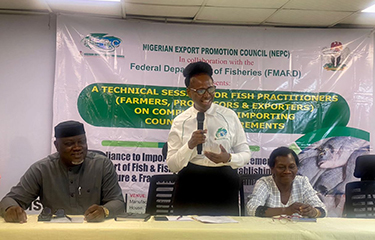In response to a regression of aquaculture production levels over the past seven years, Nigeria is teaming up with development partners to implement a catfish farming project aiming to reverse the downward trend.
Aquaculture production in the West African nation hit an all-time high of about 316,000 metric tons (MT) in 2015 but gradually declined to 290,000 MT in 2019 before spiraling to 261,700 MT in 2020, according to the Food and Agriculture Organization (FAO). Experts have attributed these falling aquaculture output figures to increased production costs and a decline in domestic seafood demand due to persistently high inflation levels and devaluation of the local currency.
The high costs of production – especially in regard to accessing affordable, high-quality fish feed – have forced many Nigerian fish farmers to switch to inferior feed over the past decade, resulting in decreased harvest sizes and overall output.
These factors have led the Nigerian government and partners such as the FAO; the E.U.; the Organization of African, Caribbean, and Pacific States (OACPS); and the German Federal Ministry for Economic Cooperation and Development (BMZ) to collaborate on a catfish-farming project titled FISH4ACP, with the objective of strengthening Nigeria’s aquaculture sector – Africa’s second-biggest aquaculture producer after Egypt.
“FISH4ACP aims to stimulate Nigeria’s catfish sector by improving access to key export markets, enhancing productivity, and supporting domestic production of high-quality fish seed and feed,” the FAO said. “Increasing competitiveness through marketing and product diversification is high on the agenda, while special attention will also be given to the environmental sustainability of farming practices.”
Among several objectives, the partners, together with Nigeria’s Federal Ministry of Agriculture and Food Security, aim to grant Nigerian fish farmers access to affordable, high-quality feed through a credit scheme under which repayment is due only after farmers harvest and sell their products.
“Nigeria wants to become more self-sufficient in fish production, as demand for fish significantly exceeds domestic production,” FAO said. “It prioritizes aquaculture, because of its potential to create jobs and business opportunities, in particular for women and youth.”
The FISH4ACP project will also support …
Photo courtesy of Nigerian Export Promotion Council








